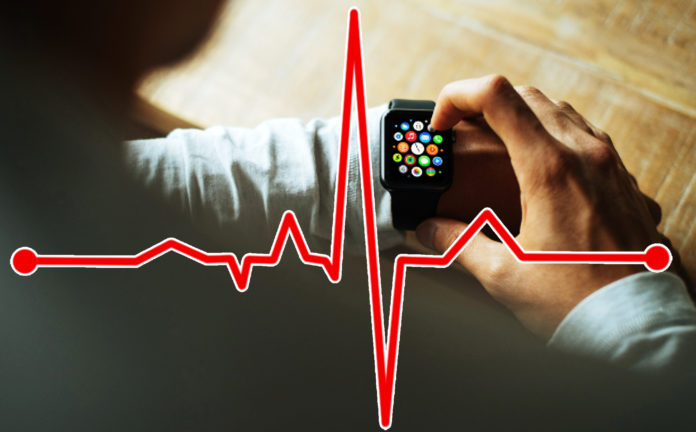A medical assessment of the ECG, atrial fibrillation (AF) detection features of the new Apple Watch
Apple watch 4 has got FDA approval as an over-the-counter product in US for Electrocardiogram (ECG) readings/recordings and another feature that detects Atrial fibrillation (AF). Attractive as they sound, do these features really have tangible health benefits?
Medibulletin explores:
ECGs are essentially the gold standard of heart rate measurement. Electrodes placed near the heart record the electrical activity of a beating heart and give an insight about the activity of the heart at that moment. Physicians usually correlate symptomatic patients with their ECG recordings and order blood tests for confirmation of heart attacks, if any.
Another feature the apple 4 watch claims of being able to notify users if their heart rate is low and in being able to inform sos numbers for emergency help if they had a fall, is not approved by FDA.
Who would get the health benefits of ECG recording?
A look at the FDA summary document reveals that the ECG app isn’t meant to be used in people younger than 22, nor is it recommended for people with other known heart conditions that can disturb your heart rhythm.
In 2013, a large-scale, randomized clinical trial published in JAMA Internal Medicine found that widespread echocardiographic screening of healthy adults had no impact on health outcomes.
The U.S. Preventive Services Task Force which is an independent, volunteer panel of national experts in disease prevention and evidence-based medicine recently reviewed the role of ECG for screening of cardiovascular disease risk. “The USPSTF recommends against screening for cardiovascular disease with resting or exercise ECG in adults at low risk of cardiovascular disease events,” the panel wrote in a statement which appeared in JAMA on June 12, 2018.
Second feature for which apple 4 watch has got approval is, for notifying Atrial Fibrillation (AF).
AF is the most common rhythm disorder of the heart (arrhythmia) and it has been recognised as a major global health burden because it increases incidence of stroke and heart attacks. The prevalence of atrial fibrillation roughly doubles with each decade of age, rising to almost 9% at 80-90 years. AF leads to ineffective contraction of the atria (chambers of the heart that receive blood) leading to stagnation of blood and increased propensity for clot formation within the left atrium.
Etiologic trends from the REALIZE AF and the first Indian registry, the Indian Heart Rhythm Society (IHRS) AF study found that the average age of patients with AF in India was 60 years and 54 years respectively (a decade younger than their western counterparts).
The FDA summary document regarding notification of episodes of AF by the apple 4 device says that the app “is not intended to provide a notification on every episode of irregular rhythm suggestive of AFib and the absence of a notification is not intended to indicate no disease process is present.”
The apple 4 watch, therefore may not be able to notify all or infrequent AF episodes.
Another feature the apple 4 watch claims of being able to notify users if their heart rate is low and in being able to inform sos numbers for emergency help if they had a fall, is not approved by FDA.
Low heart rate also known as bradycardia when symptomatic (like sudden fall), can be a sign of heart blocks requiring immediate cardiac pacing by artificial machines/devices and mostly occurs in ambulatory individuals.
Other general lifestyle features that record your activity levels, heart rate and workout data are already available in many other wearable gadgets including earlier generation of apple watches. Getting Ivor Benjamin, president of the American Heart Association, to show up on the launch stage of apple 4 watch might be a masterstroke. But the real benefits of apple 4 watch seem limited when it comes to health.
Even if we ignore the price point.



According to the licensing authority US FDA, Apple Watch 4 is only approved for ECG recordings (not useful for people less than 22 years of age or healthy adults with low CVD risk) and for its ability to notify AF ( may not notify all AF). Large scale population based trials have not found efficacy of ECG for diagnosis of CVD in low risk individuals. Studies attached. FDA did not approve the Apple 4 Watch for detection of bradycardia (which can cause falls) seen mostly in elderly with heart blocks and other rhythm disorders of heart. FDA summary document issued while approving this device can be referred for authenticity of the above comments. Thanks for valuable comments.
Dr O P Choudhury
Dear Sir… The point is the ecg monitor can catch certain anomalies like small arrythmic runs… Which threaten the patients wellbeing… But disappear by the time he or she reaches the doc… The record can be shared with a doc as a pdf who may comment… On the L1 captured. Secondly the detection of Afib… Can actually save lives. Thirdly the capturing of falls… And sending an SOS to the care provider may serve to rescue a patient in danger… Maybe even of death… Due to stroke, physical I jury and unconsciousness etc etc. What I’m trying to say is… If I have an elderly loved one, especially one living or travelling alone, or one going for say a trek with a risk of fall and u sl consciousness… I see a definite scenario for going and buying it… Its everything a smartwatch hopes to be… And then some… Humbly
Comments are closed.